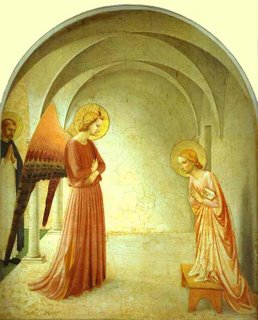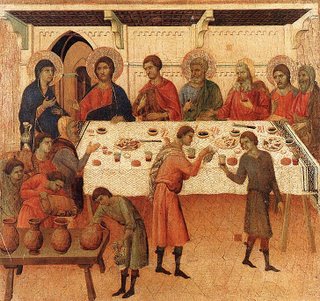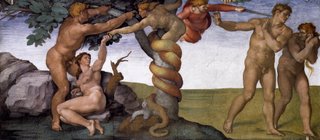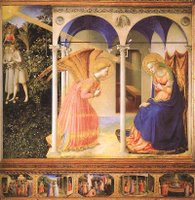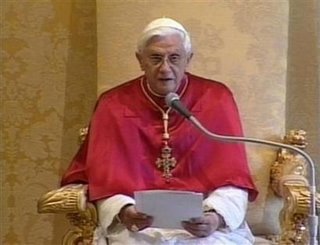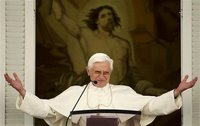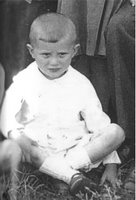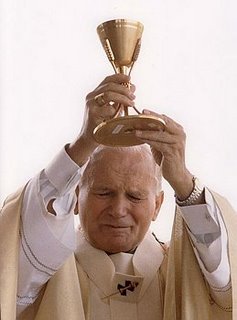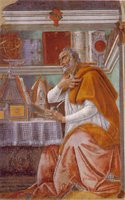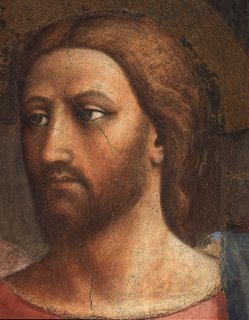
In speaking of the promise of Jesus to be with us always, to the end of the age, and the consequential “birth” of the Church, we must first address some fundamental questions: Who is God? What is God? Who and what is Man? Who and what is Jesus? Who and what is the Church?
1. Who is God? What is God?God told Moses that He is the “I am.” That means that He is Truth itself. He is Reality itself. And as the Ultimate Reality, as we learn in Genesis, He is the Creator and all-powerful. He is not one-dimensional, but exists as Father, Son, and Holy Spirit, three persons in one. He exists beyond and outside of space -- the physical universe – and because time is a measurement of changes in space, He also exists outside of time. As a result, He transcends the universe and is eternal.
2. Who is Man? What is Man?Man is a creature; that is, he is a created being, he is not self-actualizing. God did not create us as merely spiritual beings, like the angels. Rather, He gave us both a spirit and a body, and it is through our bodies that we experience things and acquire knowledge of things.
God also created Man as a social creature, one who is in need of an “other” to complete and fulfill us. Genesis informs us that “God created Man in his image; in the divine image He created him; male and female He created them.” Thus, in this account, we see that there was an original unity of male and female, man and woman; they are designed and intended for each other.
In another account of the same truth, Genesis describes how God said "It is not good for the man to be alone.” God then took a rib from the side of Adam and, from that rib, made Eve, leading Adam to exclaim, "This one, at last, is bone of my bones and flesh of my flesh.” This describes how, as individuals, there is something missing in our very being. For both men and women, there is a gaping hole in our side, and we desperately need an “other” to fill that hole. Without that "other," there is a void, an emptiness. We need to have that rib returned to our side to be whole again, to be fulfilled.
Fulfillment requires that we go beyond ourselves. Indeed, the very word suggests that we are not already "filled." We cannot be fulfilled if we are left to ourselves. We can fill part of that hole with a spouse, as with the first spouses, Adam and Eve, but even then God needs to be part of the relationship to fill the remaining void. For those who are single, God is the only one who can fill the entirety of that void because He is the One who is Love, the One who is Completeness. Unless and until the heart is filled with one or the other, a spouse or God, there is a restlessness and a hunger.
Now, at the Fall, we not only thought that we could be like gods, choosing our own truth, we thought that we could be self-sufficient and self-fulfilling. We foolishly thought that we had no need for God or others. Even today, there are many people that still believe this. In the Fall, Adam not only hides from God, but the first thing he does when confronted is to blame Eve. Proper relationships between mankind and God, and between human beings themselves, were severed, and a wide gulf of separation between them was created.
3. Who is Jesus? What is Jesus?
At His trial, Jesus was asked if He is the Messiah, the son of the Blessed One? In response, Jesus echoed the words of God in telling Moses His name, “I am.” With these words, there are only three possibilities -- either (1) Jesus was rightfully condemned as a criminal for committing blasphemy by wrongfully taking the Lord’s name in vain and equating Himself with God; (2) Jesus was delusional and insane, thereby mitigating His alleged blasphemy; or (3) He is, in fact, the “I am.”
Faith informs us that Jesus is the Christ, the Son of God – God Himself – the Word through whom the world was made. However, He is not only God in a spiritual sense, He is God incarnate, God become Man. He is
Emmanuel, meaning “God with us.” He is not merely an idea, but an actual event. He is God taking tangible form.
As the new Adam, Jesus was formed out of Mary, the new Eve, flesh of her flesh, bone of her bone. God literally bonded with and merged into mankind, becoming small, defenseless, and vulnerable while dwelling within Mary, in the most intimate of relationships.
Why did He do this? One reason He did this is because God is Love. (a) Because He loves us, as the name Emmanuel suggests, He wanted to be “with us,” among us – not only at a single point in time, but always and forever. (b) He wanted to teach us, to give us a deposit of faith, and be a Light for us -- the Way, the Truth, and the Life. (c) He wanted to “save” us -- to redeem us and repair the rift. As the Son, Jesus wanted to reconcile Fallen Man to God, to bridge the gap that Man had created and reunite us.
Accordingly, Jesus allowed Himself to be the sacrificial lamb, whose Body and Blood were given as payment for sins. He also established and gave us the sacraments. In both respects, He has an “abiding presence,” He is with us forever.
Because God is outside the “space-time continuum,” He is present not only in all time and all places, but specific points in time continue to exist forever. The Passion and Crucifixion were not isolated events in some distant past. Rather, His sacrifice is an on-going event. He is not crucified again and again, but is one sacrifice. He is perpetually being scourged, eternally on the Cross. Every sin of ours is another lash on His flesh, it is another pound of the hammer, driving nails deeper into His hands.
Jesus also has an abiding presence in the liturgy and sacraments. It is Christ who acts in the sacraments and communicates the grace they signify. The efficacy of the sacraments does not depend upon the personal holiness of the minister. However, the fruits of the sacraments do depend on the dispositions of the one who receives them.
By Baptism and Confirmation, which initiate us into the Church, the Holy Spirit is sent by Jesus, while the Anointing of the Sick prepares us for the final journey in order to join Christ in heaven. By the Sacrament of Holy Orders, which was instituted by Jesus calling His apostles, the Church is passed on to the generations throughout time. The water and chrism oil of these sacraments are sanctified by Jesus and the Cross. The recipients are anointed and joined with the Christ, which means “anointed one.”
By the Crucifixion, through the Sacrament of Penance, our sins are forgiven, and grace is given, if we accept it, to avoid further sin. By the Sacrament of Matrimony, Jesus is present to unite not only husband and wife, two into one, but to unite that one in marriage with God.
In the most obvious sense, Jesus is with us in the Eucharist. The Blessed Sacrament is His Real Presence, Body and Blood. Through the one Mass, according to his Word, Jesus is with us, not merely theoretically or as a philosophy, but physically, such that we, as bodily creatures who experience things through our senses, can be united with Him bodily, as well as spiritually.
How does this happen? How do bread and wine become the actual Body and Blood of Jesus?(a) With respect to the natural physical process, transubstantiation is what is called a “mystery.” The Church recognizes that we human beings are limited in our capacity and ability to understand certain things, and it does not even attempt to provide a complete answer for all things. Instead, it accepts that some things remain a mystery, known to and knowable by God alone. However, this should not trouble us, because there are many things in life that neither science nor philosophy can fully explain either.
(b) With respect to the supernatural process, the transformation of bread and wine into Body and Blood of Christ occur the same way that the world itself was created – by the Word. “In the beginning was the Word, and the Word was with God, and the Word was God. He was in the beginning with God. All things came to be through him, and without him nothing came to be.” (John 1:1-3) And so it was that “In the beginning, when God created the heavens and the earth . . . God said, ‘Let there be light,’ and there was light.” (Gen. 1:1-3) In like fashion, the priest at Mass, acting, not as himself, but
in persona Christi, says the words of Christ at the Last Supper, “This is my body . . . This is my blood,” and by the Word, Christ’s Real Presence comes to be with us.
Jesus also said that He is the Way, the Truth, and the Life, that no one could come to the Father except through Him. He established the Church as His Bride, two become one, and He gave the sacraments to the Church so that we could be with Him. Accordingly, we see that Christ and the Church are absolutely necessary for salvation.
4. What is the Church? Who is the Church?In answering these questions, we must acknowledge the limitations of language and our annoying practice of using the same word to mean different things, and we must differentiate between “Church” and “church.”
(a) In one usage, the Church is divine, founded by Christ, who is the Head of the Church -- One, Holy, Apostolic, and Catholic, that is, universal. The Church is an “
ecclesia,” an assembly set apart, and She has been characterized as the Mystical Body of Christ, the Bride of Christ, Temple of the Holy Spirit, and People of God. The Church is also
Mater et Magister (Mother and Teacher), where the successors of Peter and the apostles are guided by the Holy Spirit and the Faith is protected from error.
(b) In other usages, the words “Church” or “church” can refer in a human sense to members collectively, or it can refer to the building or structure in which services are conducted. In this sense, the Church is one big family. However, it is not a hotel for saints, but a hospital for sinners. And those individuals in the Church, as sinners, may do wrongful and hateful things. But just because it is populated by imperfect sinners does not mean that the Church Herself is sinful or imperfect or fallible.
The Church, as Bride of Christ, is protected by the Holy Spirit and is perfect, just as Her Spouse, Jesus, is perfect. And like Jesus, the Church does not hate; She has only love for all, including sinners. Members may and do sin, and in doing so, they may cause scandal, leading others to question the Faith or Church, or to fall away from the Church. As members of the Body of Christ, we must be very careful in our words and actions, so that we do not reflect poorly on the Church and cause scandal.
Because She was founded by Christ, we are not free to change the Church as we wish; Faith and Truth are not matters of opinion to be decided by majority vote. She is the One Universal Church of Christ, not the “Church of do your own thing.”
5. Birth of the Church and ConfirmationAlthough the Church had Her conception earlier, She is considered to have had Her “birth” at Pentecost. This was when the Holy Spirit descended on the faithful, just as it descends in the Sacrament of Confirmation. In receiving this Sacrament, we complete what began in Baptism. We receive the fullness of the Holy Spirit and become adults in the Faith.
This might be difficult to grasp at first; we might not understand how this might change us. Thus, it might be helpful to consider in context how it changed the faithful at Pentecost. Before then, the apostles and disciples had abandoned Jesus -- hiding out, afraid – but after the Holy Spirit descended upon them, after their “confirmation,” they were given the grace and strength and perseverance to go out and spread the Good News and endure persecution. So, too, your Confirmation will strengthen your graces and you will be made soldiers of Christ in order to fulfill your duty of witnessing to and defending the Faith.
It may also appear after receiving the Sacrament that nothing has happened, that you are the same as before. If no one breaks out speaking in tongues, you may be tempted to conclude that you have not received any graces. But do not be misled by such superficial appearances. By the Sacrament, your very being is altered in a fundamental way. Like with the Eucharist, you may look the same, but you are radically changed; an indelible spiritual mark or seal is left. We may not notice because sin and the contemporary world have so corrupted us that we cannot always immediately recognize God’s presence within us. But He is present nonetheless. If even only as a seed, the Holy Spirit, if you accept Him, will dwell within you and graces will grow within you.
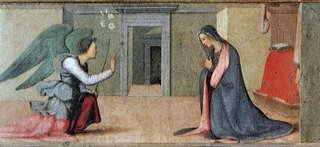 Real success is measured in becoming closer to Him and helping others to know Him and become closer to Him. That is the greatest difference any of us can make. It doesn't take a high position or great worldly power. The person who made the greatest real difference ever in the world was a simple, single, teenaged girl, who simply said "Yes" when God called. And through her, we all become closer to Him. Because of her, because of her "Yes," it is possible for us all to be with Him.
Real success is measured in becoming closer to Him and helping others to know Him and become closer to Him. That is the greatest difference any of us can make. It doesn't take a high position or great worldly power. The person who made the greatest real difference ever in the world was a simple, single, teenaged girl, who simply said "Yes" when God called. And through her, we all become closer to Him. Because of her, because of her "Yes," it is possible for us all to be with Him.
